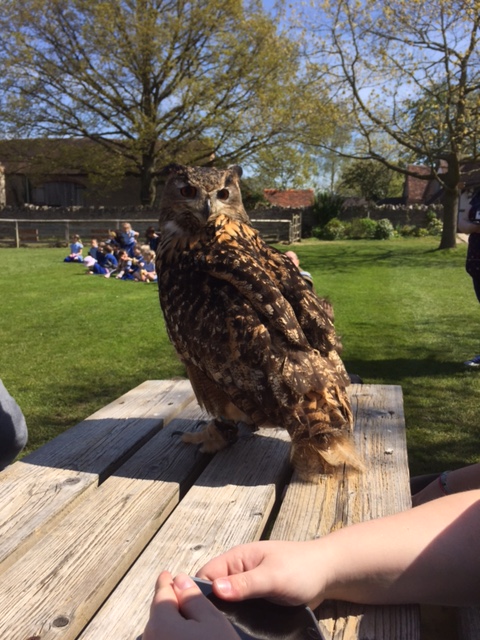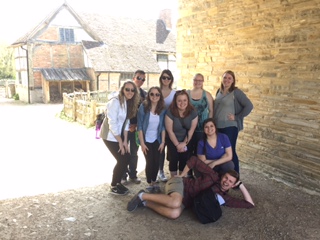During our second day in Stratford-upon-Avon, the birthplace of Shakespeare, we started our day off by going to Mary Arden’s farm. Mary Arden was the mother of Shakespeare. Her farm is now open for visits, tours, and many fun and educational activities! After walking around and seeing all of the animals that call the farm their home, we were informed that there would be a falconry display with the birds at the farm. The falconer told us about some of the birds and their uses in the Tudor era, and how different birds were used for different purposes. The type of bird you were able to have during the Tudor era depended on your rank or status. Owls were commonly used for the lower classes, while falcons were for the upper classes. For our falconry display at Mary Arden’s farm we were shown an Eagle Owl, the largest species of owl in the world! Her name was Talia, and she was definetly a sassy owl that did what she wanted to do, when she wanted to do it. After the falconer finally tempted Talia with treats, she flew with her large and colorful wings and landed right on our table!


After we left the farm and returned to our hotel to change into dress clothes for the play, we decided to head downtown and grab something to eat. We split up and found different places to eat. After we all satisfied our hungry bellies (and Jake went and got a haircut), it was time to go and see Doctor Faustus performed at the Royal Shakespeare Company Theatre! First, let me began with our thoughts on the RSC’s performance of Doctor Faustus. We have mixed emotions, thoughts, and reviews on how they portrayed this play. Let’s jump right in.
There are three major things that we discussed after the play that we were either confused about or largely disliked about the play. (Spoiler Alerts!) The first was Faustus’ most famous speech, spoken not by Faustus himself, but by Mephistophilis. While it was a very touching and emotional moment because of the powerful delivery from the actor portraying Mephistophilis, the lines were supposed to be delivered from Faustus and be a monumental moment for him. The second aspect of the play we were confused about was the almost interpretive-like dance between Faustus and Helen of Troy. In the original play, Helen only appears on stage for a short moment and then disappears again. In the RSC’s production, Helen and Faustus share a dance. After further discussion after the play, we decided that the interpertive dance represented Helen and Faustus in a struggling relationship, where they fight and then end up “dancing through life” alone as they separate from each other and Faustus is left alone on stage. The last and final thing we were a little disappointed in was the very end of play. The end of the play left us dissatisfied. In Christopher Marlowe’s, Doctor Faustus, Faustus is carted or furiously dragged away to the pits of hell. Hell was portrayed in the early theatre with something called a hell mouth, which Faustus was almost consumed or eaten by as he was being taken away to hell. Now, what we saw performed at the RSC was not as satisfying as what a hell mouth sounded like. Instead, we watched as it was only Faustus and Mephistophilis on stage and they struggle over a knife. Mephistophilis ends up stabbing Faustus and walks off as Faustus bleeds out and dies on stage as the lights go dark. Do you see what I mean??? Watching Faustus essentially die from the stabs of a box cutter is way, way less exciting when compared to watching Faustus being dragged away by demons into a fiery hell mouth.

Even though the play was not what we expected, it was interesting to see the RSC’s spin on Doctor Faustus, and as Dr. Clark said, “We got our weird play out of the way.”
